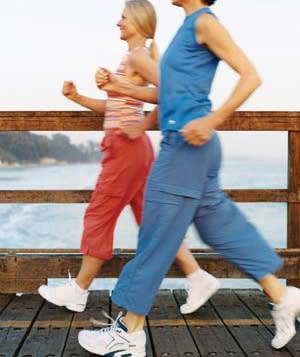3 health shortcuts that work

Doing exactly the right thing can seem impossible. These quick methods come close.
Cardiovascular Activity
The ideal: Do 30 minutes most days of the week. The surgeon general advises this near-daily regimen will help lower LDL (bad) cholesterol, raise HDL (good) cholesterol, and improve cardio health, reducing the risk for diabetes and heart disease.
The next best thing: Take three 10-minute walks each day. Short bursts have real health benefits, says Cris Slentz, Ph.D., a senior research scientist at Duke University Medical Center, in Durham, North Carolina. Assuming the intensity is identical to that of a 30-minute workout, you'll burn the same number of calories and get the heart-health benefits.
A few ideas:
Devote 10 minutes of your lunch hour to a brisk walk.
Climb a few flights of stairs several times a day instead of using the elevator.
Offer to take a friend's (energetic) dog for a walk.
Fresh Fruits and Vegetables
The ideal: Have five to nine servings of fresh fruits and vegetables daily. Eat such a bounty and you'll get a full array of nutrients, as well as plenty of fiber, says Claudia Gonzalez, a registered dietitian in Miami.
The next best thing: They may not be farmers' market-worthy, but sneak in servings this way:
Try vitamin-rich dried fruits and single-serving packs of applesauce (applesauce has less fiber than fresh apples but still contains some vitamin C).
Using frozen berries, whip up a fruit smoothie, which can hold up to three servings of fruit.
Try canned. Vegetable and bean soups are good sources of fiber and can be as nutritionally rich as fresh produce, says Gonzalez. Go ahead and take a multivitamin if you're still falling short. It may cover key nutrients. Find out how much of each nutrient you really need.
Sleep
The ideal: Get at least seven hours each night. Skimping on sleep can have a major impact on your health. A 2007 study at the University of Warwick, in England, found that women who slept fewer than five hours a night were twice as likely to suffer from hypertension as women who got seven hours of sleep. Previous studies have linked lack of sleep to weight gain and a weakened immune system.
The next best thing: If you've been short on sleep, take a nap. A recent study found that people who took a short daily nap had a lower rate of dying from heart disease than did those who never snoozed during the day.
Two suggestions:
Lie down for a 20-minute siesta in the afternoon to revive yourself.
Take a quick catnap when you get home from work to counteract the effects of lost sleep.
Keep reading: 5 more health shortcuts
Related:
Simple rear-tightening exercises
Everyday health dilemmas solved
The best drugstore cold and flu remedies
